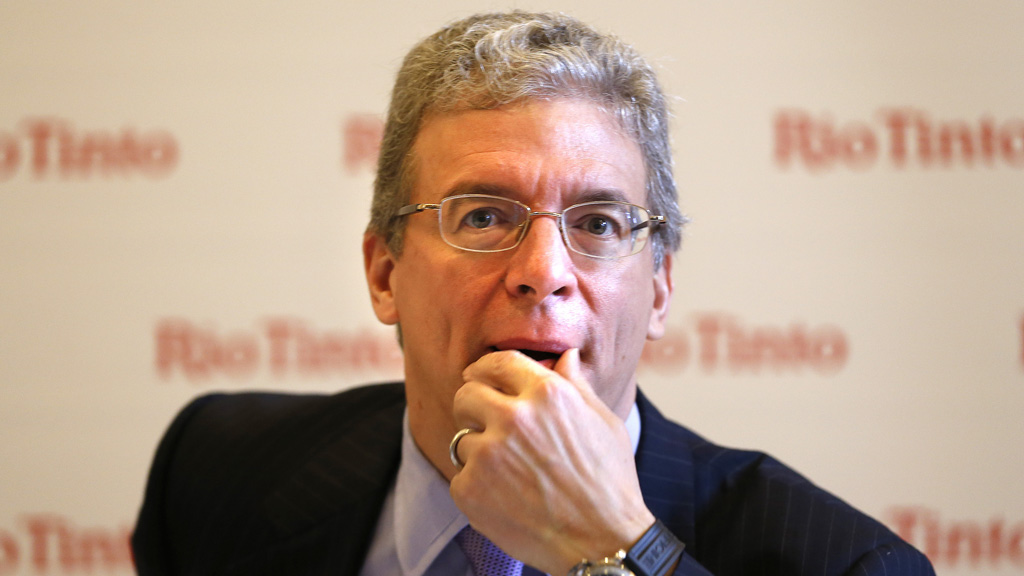Boss of mining giant Rio Tinto agrees to step down
Tom Albanese, the chief executive of Rio Tinto, has agreed to leave without a payoff or oustanding bonus in the latest high-profile departure to hit the mining industry.

The company said that Mr Albanese stepped down as chief executive “by mutual agreement” with the Rio Tinto board after more than 30 years of service. The move comes after Rio Tinto announced a $14bn write-down, related to its Mozambique coal assets and flagging aluminium business.
Doug Ritchie, the head of strategy who led the acquisition and integration of the Mozambique coal assets in his former role as energy chief executive, has also resigned, the company said in a statement today. Sam Walsh, the chief executive of the company’s iron ore, has been appointed as Mr Albanese’s immediate successor.
Announcing that he was to leave, Mr Albanese said he would “fully recognise that accountability for all aspects of the business rests with the CEO”.
Boss loss
Their departures are the latest flights from the top of major mining companies in recent months. Earlier in January, Anglo American replaced its chief executive, Cynthia Carroll. Her decision to leave, which inspired by shareholders unhappy with a drop in profits, meant that just two women were left running the biggest UK-listed companies.
BHP Billiton also said in November that it is seeking a replacement for its chief executive, Marius Kloppers, although the company claims that it is doing so under standard procedure and has refused to outline any succession timescales.
Last August, Tye Burt was ousted as Kinross Gold Inc‘s CEO, after the company announced a $2.9bn write-down. The company’s stock tumbled 60 per cent after it closed a $7.1bn takeover of the company, Red Back Mining.
Mozambique
Rio Tinto said that of the $14bn write-down, $10 to $11bn was taken off the value of the company’s aluminium assets. But it was a $3bn writedown over Rio Tinto Coal Mozambique, which was acquired in 2011, which was said to have signalled the end for Mr Albanese’s tenure.
Jan du Plessis, chairman of Rio Tinto, said: “The Rio Tinto Board fully acknowledges that a write-down of this scale in relation to the relatively recent Mozambique acquisition is unacceptable.
“We are also deeply disappointed to have to take a further substantial write-down in our aluminium businesses, albeit in an industry that continues to experience significant adverse changes globally.
“I would like to pay tribute to Tom for his considerable contribution to Rio Tinto over more than 30 years of service and for his integrity and dedication to the company.
“We are also deeply disappointed to have to take a further substantial write-down in our aluminium businesses.” Jan de Plessis, Rio Tinto
“I would also like to thank Doug for his 27 years of service to the Group and particularly for his invaluable work in developing our relationships in China. I wish them both well for the future.”
News of Mr Albanese’s departure and writedown knocked Rio shares down by 2.5 per cent to £33.72 in early London trading.
Nik Stanojevic, an equity analyst at Brewin Dolphin, suggested that while the departures were likely to be coincidental, most followed poor decisions over mergers and acquisitions.
Many of Rio Tinto’s problems emerged after the acquisition of Alcan in 2007, when the company was under pressure to bulk up or be acquired.
But the deal soured after markets crumbled and aluminium prices slumped. The company’s fortunes were compounded after the acquisition of the Mozambique-focused coal miner, Riversdale, in 2011, came up against insfrastructure problems.
Wildcat strikes
Ms Carroll stepped down after months of intense pressure from shareholders. In South Africa, the company’s mines was hit by wildcat strikes and there were also concerns about the company’s Minas Rio iron ore project in Brazil.
“All the changes are mergers and aquisitions related,” Mr Stanojevic told Channel 4 News. “Maybe a CEO’s longevity is based on not getting bad deals. Post global financial crisis, returns haven’t been there.
“They have been pretty poor, and shareholders have had to get more involved in management.”
Other analysts suggested that shareholders were becoming less tolerant of accepting poor profit margins.
Christopher Welch, chairman of the Association of Mining Analysts, and an analyst at Ocean Equities, a mining-only brokerage in London, told Channel 4 News: “I think everyone at this point in time is being called to make profit and justify their investments.
“It’s been a flipside between near term profits and long term profits in the future, and there is now disquiet among investors about whether something’s actually been delivering.
“A lot of shareholders are saying ‘you’re not delivering, we need to have someone that will’. We’re going back to basics and shareholders want to see returns sooner rather than later.
“Banks are also getting presure from their shareholders. And raising equity finance is a big struggle so that’s having a knock on effect on the mid section investors.”
Accountability
Tim Schroeders, a portfolio manager at Pengana Capital, which owns Rio Tinto shares, said that bosses were now under greater pressure to perform.
“I wasn’t expecting the $14bn writedown. “I think it’s clearly a case of the board’s laid down the law in terms of stricter accountability than we had pre-(crisis),” he said.
Sam Walsh, the new chief executive, said after news of his new role: “I will be working flat out to build an even stronger, more valuable Rio Tinto business for shareholders and for our many other stakeholders.”
-
Latest news
-
Taylor Swift’s new break-up album breaks records3m

-
NHS trust fined £200K for failings that led to death of two mental health patients3m

-
Sunak vows to end UK ‘sick note culture’ with benefit reform3m

-
‘Loose talk about using nuclear weapons is irresponsible and unacceptable’, says head of UN’s nuclear watchdog3m

-
‘There wasn’t an Israeli attack on Iran,’ says former adviser to Iran’s nuclear negotiations team7m

-




